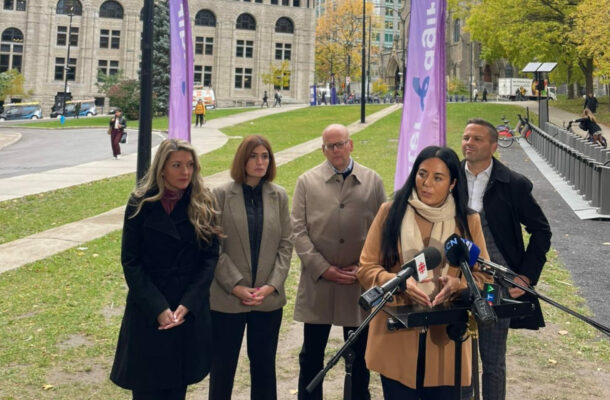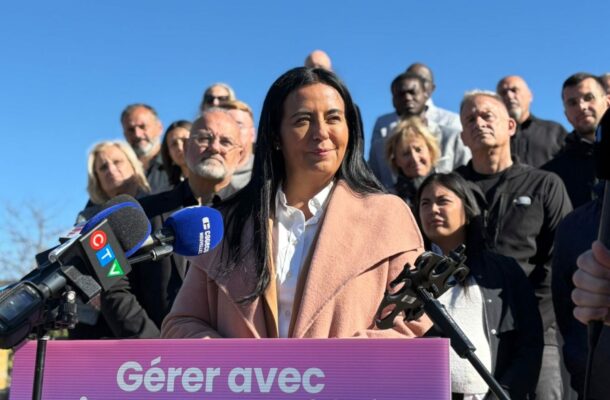Ensemble Montréal presents its minority report on the Plante-Dorais administration’s 2021 budget

Montréal, December 7, 2020 – The measures unveiled in the 2021 budget of the Plante-Dorais administration do nothing to reassure Montrealers in these difficult times. On the contrary, they further weaken the city’s financial health. Ensemble Montréal councillors are therefore announcing they will vote against the adoption of the 2021 budget and the 2021-2030 ten-year capital investment program (CIP-10) at the extraordinary council meeting to be held December 9. Their main objections are published in a minority report* that the party will submit to the Finance and Administration committee.
“Given the pandemic, we could have expected the current administration to change its practices, after having hit Montrealers with cost increases totalling close to a billion dollars in three years. What we see for 2021 is that expenditures for municipal services have increased again by $166.5 million. In fact, the only way they managed to avoid increasing overall expenditures has been to slash the cash payment of capital costs (CPCC). However, CPCC is what prevents overloading the debt, which will attain gigantic proportions in 2021,” explained Mr. Lionel Perez, Leader of the Official Opposition.
In fact, for the third consecutive year, the debt ratio (forecast at 120% for 2021) is significantly above the limit set by the city’s debt management policy, which is 100% of city revenues.
The debt is not the only element of the budget that worries Ensemble Montréal councillors. There is also the 2020 deficit of the Montréal Urban Agglomeration, on the order of $155.6 million. No information has been provided on how it will be absorbed. What’s more, there are fears of a larger deficit in 2021 since the current administration has chosen to underestimate certain expenditures and overestimate income.
“How can we forecast that in 2021, fines will bring in $195.6 million, when they amounted to $120.7 million in 2020, $75 million less? Does the administration think the pandemic will be over on January 1? It boasts of presenting a “COVID budget”, but the amounts invested in fighting the pandemic are very low compared to the actual 2020 costs. Likewise, pandemic-related public safety expenditures in the 2021 budget are significantly under-estimated compared to the 2020 actuals,” added Mr. Alan DeSousa, vice-chair of the Finance and Administration committee and Ensemble Montréal spokesperson for matters of finance and transportation.
What this says to Ensemble Montréal’s elected representatives is that the balanced budget announced for 2021 is a phony. “With forecasts like this, the city is heading straight for another deficit: COVID-19-related expenses are under-estimated and there’s no sign of any genuine effort to reduce general expenditures. Not to mention that they’re using $178 million from the Québec government – an unplanned and non-recurrent amount – to pay their 2021 operating expenses. So where will they get another $178 million to balance the 2022 budget?” asked Mr. Perez.
Council members also condemned the Plante-Dorais administration’s 2021-2030 CIP-10, a ten-year capital investment plan (replacing the earlier three-year CIP) that offers nothing new except allowing them to announce today “priority” projects that will not take place for many years to come.
“The case of connecting Boulevard Cavendish is a striking example. Everyone knows how important this project is for the redevelopment of the old hippodrome area. They’re telling us that Cavendish will get $245 million in the CIP-10, but the first instalment won’t be paid until 2024. So the current administration can boast it’s investing hundreds of millions in a project which, in reality, is still at least four years away,” notes Mr. DeSousa.
With respect to the waterfront park that must replace the Lachine marina – closed in summer 2020 by the Projet Montréal administration without consultation and without notice to some 400 boaters – the CIP-10 provides only $5.7 million over the next three years. To all appearances, the real construction work won’t start before 2024. “So was it really worth it to act with so much urgency? Nothing in the CIP-10 justifies such a precipitous closure,” continued Mr. DeSousa.
In the end, the Plante-Dorais administration developed its 2021 budget with the same recklessness as their earlier budgets. “This administration just can’t stop itself from always spending more money. It was evident in the years before the pandemic; it hasn’t changed for 2021 – except that now, the consequences are much more serious. Without a radical cut in expenses, without increasing the cash payment to reduce the debt load, and with overestimating anticipated 2021 revenues, the city will hit the wall. How many more times will the Québec government be willing to rescue its metropolis?” concluded Mr. Perez.
* To read Ensemble Montréal’s minority report (in French): https://bit.ly/2LdhEBM
Our proposed amendments
Knowing that the budget and the CIP-10 will be adopted even without Official Opposition support, Ensemble Montréal would nevertheless like to make improvements to the extent possible.
That’ why the Official Opposition’s elected members will present a series of five amendments aiming to correct some of the shortcomings identified in the administration’s proposals:
- Create a budget item “Appropriations for contingent COVID-19 expenses” and allocate to it a sum of $25 million, by transferring the $5 million planned contingent spending and drawing an additional $20 million from the operating expenses of central departments, excluding the boroughs.
- Create a body camera acquisition program for SPVM officers in the 2021-2030 CIP and allocate to this program $7 million for 2021 and $10 million for 2022 by drawing the necessary funds from the amounts budgeted for the Express Bike Network and bicycle path network development for these two years.
- Allocate an additional sum of $1 million to the mixed intervention teams for the homeless and psychosocial emergencies in order to hire social workers at the SPVM, drawing this sum from the SPVM’s operating expenses.
- Add additional sums of $10 million each for 2021 and 2022 to the land acquisition and social and community housing creation program to the 2021-2030 CIP. To this end, we propose drawing amounts of $10 million in each of 2021 and 2022 from the sums allocated in the 2021-2030 CIP for the Express Bike Network and bicycle path network development.
- Create a program to maintain the ecological value of natural environments in parks under the responsibility of the major parks department in the 2021-2030 CIP, and allocate to the program annual amounts of $2.2 million for the entire duration of the 2021-2030 CIP.





